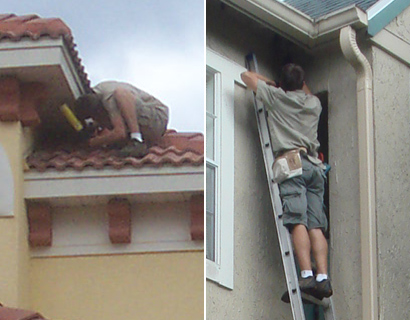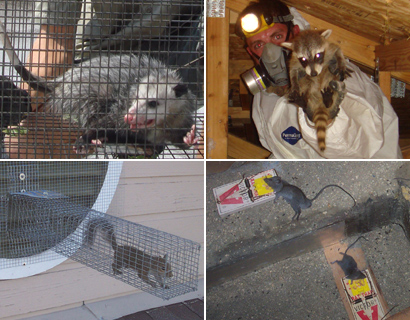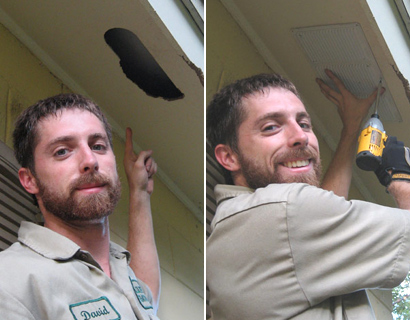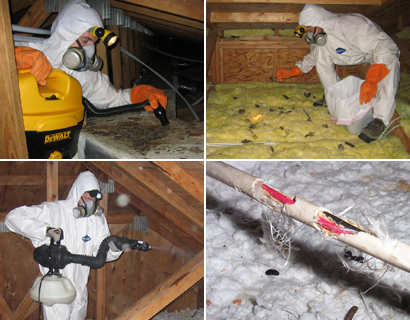- How We Solve North Carolina Wildlife Problems
How We Solve Fayetteville Wildlife Problems
INSPECTION: Once on site, we will perform a full inspection of your home and property. This allows us to use the correct strategy and traps. If the animals are in an attic, a full building inspection is crucial, including the following:
- All ground-level areas, such as piper or A/C line entry & exit areas, A/C chase bottoms, ground-level vents, etc.
- All mid-level areas, such as dryer vents, siding gaps, first floor eaves or dormers, etc.
- We inspect the entire roof, including all plumbing stacks, ridge caps, vents, and other potential gaps or holes.
- We also inspect inside your attic, to identify animals and damage they have caused.
- If the animals are outside, we notice many subtle clues that will assist us in a successful strategy.
TRAPPING, EXCLUSION, REMOVAL: Once we understand what animal species we are dealing with, and the problem, we use the most effective means of removing the animals. We use dozens of different types of traps.
- Trapping - If trapping the animal(s) in live cage traps, trap type, set, and location are crucial to success.
- Exclusion - Oftentimes, we are able to simply set one-way doors or other exclusion devices that allow the animals inside a building to safely exit, but never get back inside.
- Removal By Hand - Sometimes we actually remove animals by hand, or with special tools like snare poles.
- The Law - In all cases, we obey state and local laws regarding wildlife, but aim to take the most humane approach.
ENTRY HOLE REPAIRS: Repairs are a crucial step in the wildlife removal process. In many cases, such as bat or rodent control, the job cannot be performed without detailed repairs, and in all cases, sealing the entry holes shut ensures that no future wildlife will ever enter your home.
- 100% of the entry holes must be found, and sealed shut, or the job is not complete.
- Our repairs are professional contractor grade, look good, and when applicable we use steel, which rodents such as rats or squirrels are unable to chew through.
- We give a written guarantee on our repairs against any future animal entry.
ATTIC DECONTAMINATION SERVICES: It may be desirable to clean your attic after we've removed the animals. They can leave behind large amounts of droppings, urine, hair, oils, food, nesting material, and so on. These remnants can attract insects like cockroaches, and the scent left behind can encourage new animals to chew their way into your house. You might experience odor problems from the waste. It's possible that mold will grow on waste areas.
- We remove or vacuum all droppings, or remove all the soiled insulation.
- We fog the attic with a special enzyme-based cleaner that destroys any organic matter and deodorizes the space.
- We repair damage, such as ductwork, electrical wires, pipes, insulation, and more.
Any change in our Fayetteville weather can be the reason why you have been finding wildlife such as birds, snakes and rodents in your home. These problems can be as simple as shooing them out of your home, or they can be as tough as having to remove a nest with babies from under your home or your attic. What ever your case may be, we are here to help. All you have to do is give us a call! We service the following cities: Beaufort, Boone, Carrboro, Clayton, Cornelius, Dunn, Fuquay-Varina, Harrisburg, Holly Springs, Hope Mills, Huntersville, Indian Trail, Kernersville, Knightdale, Leland, Matthews, Midland, Mint Hill, Mooresville, Mount Pleasant, Oxford, Shallotte, Smithfield, Southern Pines, Tarboro, Winterville, Wilmington, Jacksonville, New Bern, and Morehead City. We also service the following counties: Guilford County, Henderson County, Hoke County, Hyde County, Jackson County, Lincoln County, Macon County, New Hanover County, Northampton County, Polk County, Wayne County, and Wilkes County.
Other Fayetteville animal pest control topics:
Should I ever Poison an Opossum
Will a Rat in the Attic Have a Nest of Babies
What do Wildlife Rehabilitators do With Groundhogs
What Kind of Damage do Bats Cause in an Attic?
To learn more about our services, visit the Fayetteville wildlife control home page.
This month's wildlife how-to article: Does Poison makes rats thirsty and die outside?
Does Poison makes rats thirsty and die outside?
Poisons are usually prohibited by law in so many countries of the world , for application against rats. One of the reasons why it is not ideal to use poisons against rats is that it is both unsafe to humans and the environment. First of all, your hand or any other body part must not come in contact with rat poisons. Researches have even shown that rat poisons have killed several people despite the fact they washed their hands after applying the poisons on rats.
Secondly, most rats that consume poisonous substances, especially those mixed with baits, often die in difficult places where they are difficult to reach, thus their carcasses will remain in such places for a very long time, generating unpleasant odours that can trigger epidemic diseases. It is often better to catch rats through the use of traps because they get hooked in one position and their carcasses can be disposed immediately without causing any problems to the society. When a rat dies in difficult places like the attic or chimney tops, it becomes extremely difficult for you to remove it. Sometimes a rat may die in your backyard and your pet may eat it up and fell ill.
The use of rat poisons can backfire, especially when your pet pick up a bait you set for a rat – such a pet may start vomiting or even suffer from diarrhea or may die . Rats don’t get thirsty as a result of poison, rather, the poison often damage their vital organs( such as the liver, bladder and kidney), and for this reason, rats die slowly from poisons, and they may never die outside of your home, rather they prefer to die in the comfort of their nests.
When a rat picks up poison, it takes a while for the rat to digest the food or material on which the poison was placed, and by the time the poison takes effect, the rat will probably remain active. If you notice that a rat has picked up poison and it is behaving abnormally by running through the walls and making noises, then you should try as much as possible to force the rat to die outside of your home, otherwise, it may become difficult to remove its remains. Rats often become hyper-active when they eat a poison, they may stop eating and find an isolated place thinking they will get relieve from the poison.
It is ideal to start searching for rats if you believe they have ate the poison given to them , ideally you must look for them around the walls, under the sheds, gardens , and close to areas where there are water. Though it depends on where they ate the poison, if they eat the poison indoors, they will probably diet somewhere within your home.





